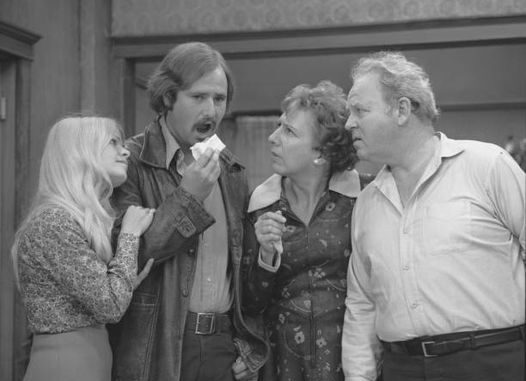
Norman Lear’s recent passing was a reminder of the seismic cultural impact of All in the Family, a show that broke new ground in sitcoms by confronting uncomfortable societal truths. Yet, while the show’s trailblazing themes and unforgettable characters are well-remembered, one of the most enduring aspects of the series is its theme song, “Those Were the Days.” Written by the celebrated musical duo Lee Adams and Charles Strouse, the song encapsulated the show’s core message in a deceptively simple, nostalgic tune.
At first glance, “Those Were the Days” sounds like an old-fashioned ditty—sweet, familiar, and almost quaint. But under its surface lies a brilliant commentary on the show’s central themes: the tension between the past and the present, and the characters’ resistance to societal progress. The song is sung by Archie and Edith Bunker, whose nostalgic longing for a simpler, more “ordered” time becomes a bittersweet reflection of their own ignorance and bigotry. The lyrics, with their wistful refrain of “Girls were girls and men were men,” capture the cultural conservatism of Archie, while Edith’s enthusiastic yet nasally performance conveys a sense of naive joy in clinging to an outdated ideal.
Interestingly, the song’s nostalgic tone masks a deeper irony. As historian Jim Cullen points out, the lyrics make little sense when scrutinized—Archie, for instance, longs for the days of Herbert Hoover, despite having benefited from the very programs (like the welfare state) he claims to despise. This dissonance between the song’s idealized past and the flawed reality of Archie’s present mirrors the show’s broader critique of American society—what All in the Family did so well was to use humor and satire to expose these contradictions.
Adams and Strouse’s song was conceived with the same deliberate sense of irony that defined the series itself. The theme was originally going to be the title of the show—Those Were the Days—before it was changed to All in the Family. The duo, who had already established themselves in Broadway musicals like Bye Bye Birdie and It’s a Bird… It’s a Plane… It’s Superman, brought a nostalgic touch to the music, influenced by their own childhood memories of families gathered around the piano. But instead of a polished, sentimental anthem, the Bunkers’ rendition—with its creaky piano and off-key singing—was a perfect reflection of the characters’ dissonance with the world around them.
The song’s blend of the old-fashioned with the ironic has made it resonate beyond the original run of All in the Family. Over the years, “Those Were the Days” has been honored, parodied, and covered in various forms—most notably by The Simpsons and Family Guy, shows that took the same satirical approach to American life that Lear pioneered. Even when performed by artists like Sammy Davis Jr. or Henry Mancini, the song’s biting undercurrent was lost in their smooth renditions, turning the nostalgic cry into mere musical fluff.
Perhaps the most iconic recent tribute came during the live remake of All in the Family for ABC’s Live in Front of a Studio Audience special, where Marisa Tomei’s performance of Edith’s part captured the rawness of the original, without the polish of modern performances. In these moments, “Those Were the Days” is not just a theme song, but a reflection of how humor and nostalgia can illuminate the changing tides of American society—suggesting that, while the past may seem comfortable, it’s often more fraught with contradictions than we like to remember.
In the end, “Those Were the Days” stands as more than just a theme for All in the Family—it’s a snapshot of an era in American television, one that challenged viewers to reflect on where the country had been and where it was going. The song captures that ambivalence perfectly: it’s a bittersweet farewell to outdated modes of thinking, packaged in a melody that feels comforting yet unsettling, just like the show itself.
